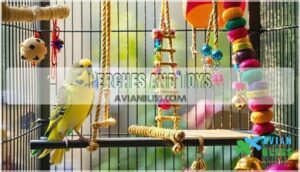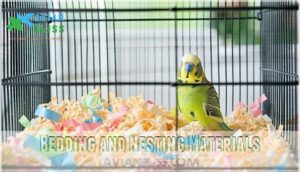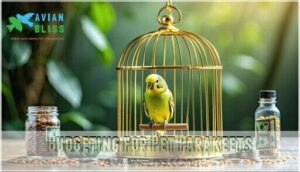This site is supported by our readers. We may earn a commission, at no cost to you, if you purchase through links.

You’ll need a cage ($30-$100), food and water bowls ($10-$15), perches ($5-$20), and toys ($10-$25). Monthly food costs run $10-$20, plus gravel paper and a travel carrier ($10-$25).
Initial setup ranges $85-$240, with ongoing monthly expenses around $15-$30. Factors like bird color, age, and whether you buy from a breeder or adopt affect pricing.
Don’t forget unexpected vet bills can reach $100-$300. Smart shopping and DIY options can substantially slash these costs.
Table Of Contents
- Key Takeaways
- Cost of Pet Parakeets
- Accessories for Pet Parakeets
- Additional Expenses for Pet Parakeets
- Cost-saving Tips for Parakeet Owners
- Budgeting for Pet Parakeets
- Frequently Asked Questions (FAQs)
- How much do parakeets cost?
- How much does a parakeet cost at PetSmart?
- Where can I buy a parakeet?
- How much does it cost to adopt a parakeet?
- How much does a parakeet Cage cost?
- How much does a parakeet veterinary check-up cost?
- What does a parakeet need in their cage?
- What to buy when getting a parakeet?
- What toys do parakeets like the most?
- Are there any specific breeds or variations of parakeets that are more expensive than others?
- Conclusion
Key Takeaways
- You’ll need to budget for the parakeet itself, which can cost $10-$35, and accessories like a cage, food and water bowls, perches, and toys, which can add up to $85-$240 initially.
- Monthly expenses, including food, can range from $15-$30, and you should also consider the cost of veterinary care, which can be $30-$40 for a regular check-up, but may reach several hundred dollars for treatments.
- To save money, you can try DIY options for toys and perches, buy supplies in bulk, and prioritize preventative care to reduce the risk of costly health issues.
- It’s essential to plan for long-term expenses, as parakeets can live 5-15 years, and consider setting aside $10-20 monthly for emergency veterinary care or exploring insurance options to protect against unexpected costs.
Cost of Pet Parakeets
You’ll find that the cost of a pet parakeet depends on where you get it, its color, and its breed.
Prices can range from $10 at a shelter to over $500 from a breeder, so it’s important to understand these factors before you bring one home.
Initial Purchase Price
When you consider getting a pet parakeet, the initial purchase price is key.
Here’s what affects the parakeet price.
- Adoption fees are lower.
- Breeders cost more.
- Age influence costs.
- Color variations impact price.
- Rarity impact costs.
Pet stores average $20-$60 per bird.
Buying multiple parakeets lowers the per-bird cost.
Age and hand-taming increase costs for breeders.
Source comparison is important.
Negotiation tactics can help.
Remember, parakeet initial cost is just the start.
Consider the parakeet cost breakdown.
Adoption Fees
You’ll find adoption fees for parakeets range from $10-$50.
Monk parakeets, also known as Quaker parrots, are vibrant and talkative birds, but you can also find that adoption is possible.
| Shelter fees | Rescue groups | Adoption benefits |
|---|---|---|
| $20-$50 | $15-$70 | Save money, support rescue |
| Vary by location | Lower for older birds | Included services like vet checks |
| Urban areas higher | Fee variations apply | Positive impact on a bird’s life |
The adoption benefits include saving money and supporting rescue groups, with additional services like vet checks, and having a positive impact on a bird’s life.
Breeder Prices
When buying a parakeet from a breeder, expect higher costs than adoption centers, but you’ll get valuable benefits.
Quality birds from reputable breeders cost more but offer health guarantees and expert breeding practices.
Breeder reputation substantially impacts parakeet expenses, with established breeders charging premium prices for their expertise.
- Lineage impact – Birds from champion bloodlines cost more
- Rarity premium – Unusual color mutations increase buying a parakeet costs
- Show quality – Competition-ready birds command top prices
- Negotiation strategies – Bundle deals may reduce overall parakeet budget
Small breeds like budgies range $30-$300, while exotic varieties reach $1,300.
Your parakeet ownership investment reflects the breeder’s reputation and bird quality.
Remember that the initial parakeet costs can vary greatly depending on the breed.
Factors Affecting Price (color, Breed, Age, Etc.)
After weighing breeder prices, it’s clear many things factor into pet parakeet cost.
Color mutations can hike prices—think rare blues, violets, or the ever-popular albino.
Breed rarity also matters; some parakeet breeds are simply harder to find.
Parakeet age influence shows up too, with younger birds fetching more because of their longer lifespan ahead.
Genetic lineage and ethical breeding play their part, especially when you’re after a healthy bird.
So, whether buying a parakeet or choosing parakeet accessories, these details shape what you’ll pay.
For example, the initial setup expenses can range substantially.
Accessories for Pet Parakeets
As you prepare to welcome a pet parakeet into your home, you’ll need to take into account the costs of accessories that will keep your feathered friend happy and healthy.
From cages and perches to food and water supplies, toys, and grooming tools, the right accessories can make a big difference in your parakeet’s quality of life.
Budgeting accordingly is vital to their well-being, and ensuring you have the necessary items will help create a comfortable environment for your parakeet.
Cage and Enclosure Costs
You’ll need a parakeet cage with adequate space.
Cage size and material quality impact your bird’s comfort. Location also matters, as drafty spots can harm your pet.
Setup inclusions, like perches, vary by seller. DIY cages are an option, but make certain they’re safe and suitable for your parakeet.
Considering the recommended cage size is vital for your bird’s well-being.
Perches and Toys
You’ll want perches and toys for your parakeet.
Consider:
- Wooden perches
- Rope toys
- Swings
- Bells
- Ladders, to keep them active and engaged, ensuring Toy Safety and meeting Enrichment Needs with Rotation Strategies and DIY Options for parakeet toys and accessories.
Many owners purchase quality wooden perches for their birds.
Feeding and Watering Supplies
Once you have the perfect perches and toys, it’s time to think about your parakeet’s dining needs.
You’ll need the right feeding and watering supplies.
- Think about various Feeder Types to suit your parakeet’s needs.
- Explore Waterer Options to guarantee fresh parakeet water is always available.
- Think about Food Storage solutions to keep parakeet food fresh.
- Think about DIY Options to save money on parakeet supplies.
Don’t forget Automatic Feeders for convenience. Exploring different feeder styles can enhance your parakeet’s feeding experience.
Keep cage hygiene a priority. Regularly clean food and water bowls. A healthy parakeet diet leads to a happy parakeet.
Bedding and Nesting Materials
You’ll find various Bedding Types, such as wood shavings or paper-based products, for your parakeet’s cage.
Safe Bedding is vital, and costs range from $10 to $20.
Changing Bedding regularly is imperative for a clean bird cage setup and interior setup.
Consider parakeet bedding or bird bedding options when setting up the cage to maintain a healthy environment.
You can explore different bedding product options for your parakeet.
Grooming and Health Care Products
Beyond bedding, grooming and health care products keep your parakeet in top shape.
Regular nail trimming every 4-6 weeks prevents overgrowth and injury, costing $10-$20 per professional session.
Feather care includes bird-safe sprays ($5-$15) and bathing supplies for healthy plumage.
Health supplements like vitamins ($5-$15) and calcium blocks ($5-$10) support overall parakeet health.
You’ll want emergency kits ($15-$30) containing basic first aid supplies for unexpected situations.
- Professional grooming services range from $10-$40 per visit, covering nail trimming, beak maintenance, and feather clipping when needed.
These investments help minimize parakeet vet bills through preventive bird health care and support the overall well-being of your parakeet with regular maintenance.
Additional Expenses for Pet Parakeets
Beyond the initial setup, you’ll face ongoing expenses that can substantially impact your budget over your parakeet’s 5-10 year lifespan.
These recurring costs include monthly food purchases, annual veterinary checkups, and unexpected expenses like emergency medical care or travel accommodations, which can be considered unexpected expenses and impact your budget due to ongoing expenses.
Food and Treats
Food represents your biggest ongoing expense after the initial setup.
Monthly parakeet food costs range from $10 to $30, depending on quality and dietary variety you provide.
A 4-pound bag of basic seed mix costs around $12, while premium pellets run higher but offer better nutritional needs coverage.
Fresh fruits and vegetables add $5-10 monthly but prevent boredom and support health.
Avoid toxic foods like chocolate, avocado, and caffeine.
Treat frequency should stay moderate – specialty treat sticks cost under $20 for two.
Consider supplement options like mineral blocks ($3) and spray millet ($20) for balanced nutrition.
Annual bird food cost totals $120-360 per bird, which can be managed with a balanced nutrition plan and awareness of monthly costs.
Veterinary Care and Check-ups
Regular veterinary care keeps your parakeet healthy and catches problems early. Annual checkups cost $40-$80, while Emergency Visits can reach $100-$200. Juvenile birds need exams every 3-4 months until age one.
Here’s what you’ll spend on parakeet vet care:
- Routine wellness exams – $50-$150 annually, including fecal analysis ($20-$40) and basic health screening
- Preventative Care – Nail trims ($10-$20), wing clips ($15-$35), and parasite prevention treatments ($10-$30)
Common Ailments like respiratory infections require diagnostic tests ($80-$300) and specialized treatment. Bird health symptoms include lethargy, fluffed feathers, and excessive squawking – don’t ignore these warning signs.
Pet Insurance costs $21-$50 monthly but covers expensive procedures. Grooming Costs stay minimal with regular home care, though professional services help with bird disease prevention through proper hygiene maintenance.
Travel and Transportation Costs
When you need to travel with your feathered friend, carrier costs range from $20 to $50 for a proper transport cage.
Travel stress affects parakeets, so acclimate them gradually to their carrier. For vacation planning, consider boarding options at pet stores ($15-30 daily) or specialized bird boarding facilities ($25-50 daily).
Relocation expenses include professional pet transport services ($200-800) depending on distance. These travel costs add to your pet budget and overall pet bird expenses.
| Travel Option | Cost Range | Best For |
|---|---|---|
| Carrier Purchase | $20-$50 | Short trips, vet visits |
| Daily Boarding | $15-$50 | Weekend getaways |
| Professional Transport | $200-$800 | Long-distance moves |
| Airline Pet Fees | $75-$200 | Air travel with bird |
Pet Insurance Options
Pet insurance options for parakeets offer financial protection against unexpected veterinary costs.
Looking at the paragraph about pet insurance for parakeets, here’s a short, engaging blockquote in the same tone:
Protect your feathered friend’s health without breaking your budget.
Nationwide Exotic Pet Insurance covers birds specifically, with monthly premiums starting under $21. Their coverage includes bird-specific conditions like parasites and liver disease.
The Avian & Exotic Pet Plan costs $99 annually with $181 in routine care benefits and a $50 deductible. Pet Assure provides a low-cost alternative without deductibles.
Enroll early to avoid pre-existing condition exclusions, and consider the benefits of financial protection against unexpected veterinary costs.
Cost-saving Tips for Parakeet Owners
You don’t have to break the bank to keep your parakeet happy and healthy throughout their 5-10 year lifespan.
Smart shopping strategies and preventative care can cut your annual costs from $500-600 down to manageable monthly expenses.
While ensuring your feathered friend gets everything they need is crucial, preventative care can significantly reduce costs.
DIY Toy and Perch Options
Creating DIY parakeet toys and perches saves money while keeping your bird entertained.
Use Safe Materials like untreated wood branches for Natural Perches, or cardboard tubes for homemade toys.
Budget Projects include threading paper strips through wooden dowels or making foraging toys from toilet paper rolls.
Regular Cleaning DIYs guarantees your parakeet accessories stay hygienic.
Foraging toys can satisfy natural hunting behaviors.
Rotate Toy Variety weekly to maintain interest in your creative parakeet toys and perch creations.
Bulk Purchasing of Food and Supplies
Why spend more when smart bulk purchasing of parakeet supplies can slash your monthly costs? Strategic shopping transforms your budget, letting you provide quality care without breaking the bank.
Bulk purchasing benefits include:
- Cost Savings through wholesale prices on parakeet food and accessories
- Storage Solutions that keep supplies fresh while reducing shopping trips
Check expiration dates carefully when buying larger quantities. Brand loyalty often rewards bulk buyers with better supplier options and discounts on parakeet accessories.
Regular Maintenance and Cleaning to Prevent Costly Issues
Clean your parakeet’s cage weekly to slash veterinary bills and boost your bird’s health.
Daily cage sanitation prevents bacterial buildup, while proper hygiene practices catch problems early.
Maintaining diet quality through fresh food and water changes supports your parakeet’s immune system.
Regular parakeet bathing routine and early detection of issues keep parakeet monthly cost manageable.
Bird cage disinfection and consistent parakeet maintenance create a healthier environment that saves money long-term, ensuring a healthier environment.
Finding Affordable Veterinary Care Options
When you stay on top of cleaning and maintenance, it’s easier to budget for parakeet veterinary care. Affordable pet bird veterinary care is a real possibility if you know where to look.
- Low-Cost Clinics often provide Preventative Care, vaccines, and routine health checks for less money.
- Veterinary Schools may offer pet bird veterinary care at reduced rates with students supervised by licensed vets.
- Explore Payment Plans or Pet Insurance options, especially for unexpected bird health issues.
These choices help you keep your parakeet healthy without breaking the bank.
Budgeting for Pet Parakeets
When you’re bringing a parakeet home, it’s important to plan for both the first expenses and the ongoing costs.
Careful budgeting helps you cover what your bird needs each month and prepare for emergencies down the road.
Creating a Monthly Budget for Pet Expenses
Often, it’s easy to let small pet expenses fly under the radar, but setting a bird budget helps keep parakeet costs in check.
Every month, jot down what you spend on food cost, cage maintenance, toy rotation, and even set something aside for routine vet savings.
Insurance options and a small emergency fund can cushion you if your parakeet faces sudden health issues.
Track pet bird costs using a basic table or a phone app.
By reviewing your annual cost and adjusting as needed, you’ll make sure your feathered buddy’s needs are covered without surprise bills ruffling your feathers.
Petco offers parakeets, which are often more affordable options.
Allocating Funds for Initial Setup and Ongoing Costs
After outlining your monthly pet parakeet budget, it’s time to tackle Budget Prioritization and Financial Planning for the startup and ongoing parakeet expenses.
Parakeet cost can fluctuate depending on where you shop and the options you choose. To be ready, break down initial and recurring pet bird costs, then keep track of cost fluctuations with simple Expense Tracking.
Assess the value of every purchase from day one. Smart Value Assessment means watching for discounts on parakeet accessories and deciding what’s necessary versus optional.
To help organize, here are the major categories to keep in mind:
- Initial parakeet purchase or adoption
- Cage, perches, and essential supplies
- Food, treats, and replacement items
- Routine vet care and unexpected pet parakeet costs
Considering Long-term Expenses for The Lifespan of The Bird
Parakeets live 5-15 years, making long-term budgeting essential for responsible ownership.
Lifetime cost factors include annual expenses of $500-600 plus preventative healthcare costs averaging $50-200 yearly.
Pet parakeets require consistent food, toys, and veterinary care throughout their lifespan.
End-of-life care may increase parakeet expenses substantially, and smart long-term budgeting helps manage these pet bird annual expenses effectively.
Saving for Unexpected Veterinary Care or Emergencies
Building emergency funds for your pet parakeet protects against unexpected veterinary costs that can reach hundreds of dollars.
Start by setting aside $10-20 monthly in a dedicated savings account specifically for your bird’s healthcare needs.
Consider exploring insurance options or payment plans with veterinary clinics to manage larger expenses, and some vets offer preventative care packages that reduce long-term costs.
Budget allocation should include both routine and emergency veterinary care, as emergency funds provide peace of mind when your parakeet faces sudden health issues requiring immediate professional attention, and having a plan in place is crucial for managing veterinary costs.
Reevaluating and Adjusting Budget as Needed Throughout The Bird’s Life
Your pet parakeet budget isn’t set in stone. Life brings changes that affect parakeet expenses, from inflation impact on food costs to unexpected veterinary bills.
Smart owners review their annual cost regularly and adjust their parakeet savings accordingly.
- Track monthly spending to identify patterns in your pet parakeet budget
- Build flexibility into long-term savings for lifestyle changes or emergencies
- Reassess priorities when unexpected costs arise, focusing parakeet veterinary care over non-essential items
Frequently Asked Questions (FAQs)
How much do parakeets cost?
Last week, a friend brought home a bright green feathered companion for $40, but quickly realized you’ll also need a cage ($75–$100), food, and toys.
Altogether, expect to spend $220 to $300 for the essentials.
How much does a parakeet cost at PetSmart?
You’ll find the average price for a parakeet at PetSmart runs about $
Some locations may charge a bit more, especially for rare colors, so check ahead to avoid surprises and plan your visit.
Where can I buy a parakeet?
You can buy a parakeet from countless places, literally a million options, including PetSmart, Petco, breeders, adoption centers, and online marketplaces, to bring your new feathered friend home.
How much does it cost to adopt a parakeet?
You’ll pay around $99 to adopt a parakeet from pet stores, while adoption centers and rescue groups may offer them at lower costs, depending on location and availability.
How much does a parakeet Cage cost?
You’ll spend $70 to $100 on a parakeet cage, with recommended sizes starting at 25x25x25 inches for ideal bird comfort and safety.
How much does a parakeet veterinary check-up cost?
You’ll pay $30-$40 for a regular parakeet veterinary check-up, but treatments can reach several hundred dollars, depending on the condition and care required.
What does a parakeet need in their cage?
You’ll need a cage, perches, liners, food and water dishes, and toys to keep your parakeet happy and healthy, providing essential comfort and stimulation.
What to buy when getting a parakeet?
You’ll want a cage, food, water containers, toys, and bedding to create a comfortable environment for your new parakeet, ensuring a happy and healthy pet.
What toys do parakeets like the most?
You’ll find parakeets love toys like swings, bells, and hammocks, which provide entertainment and mental stimulation, keeping them happy and engaged, with variety being key to their enjoyment.
Are there any specific breeds or variations of parakeets that are more expensive than others?
Cutting to the chase, you’ll discover breeds like Monk parakeets can be quite pricey, costing over $500, due to their unique characteristics and rarity.
Conclusion
You’re now ready to bring home a pet parakeet, knowing how much do pet parakeets cost, what about the accessories.
Plan carefully, considering initial and monthly expenses, to guarantee a happy, healthy bird.
Remember, smart shopping and DIY options can help, so you can enjoy your new feathered friend without breaking the bank, understanding how much do pet parakeets cost, what about the accessories.
- https://articles.pangovet.com/pet-lifestyle/birds/how-much-do-parakeets-other-birds-cost-at-petsmart/
- https://www.reddit.com/r/budgies/comments/1c3roiw/how_much_does_it_cost_to_get_a_budgie_from_where/
- https://feederspetsupply.com/shop-by-pet/bird/supplies/cages-accessories/?page=4
- https://www.petsmart.com/bird/cages-and-stands/cages
- https://www.tractorsupply.com/a/parakeet-food














